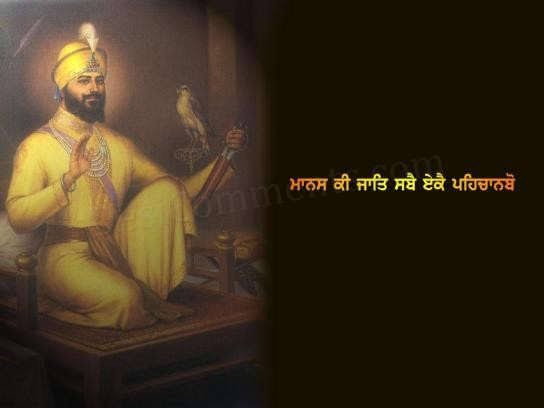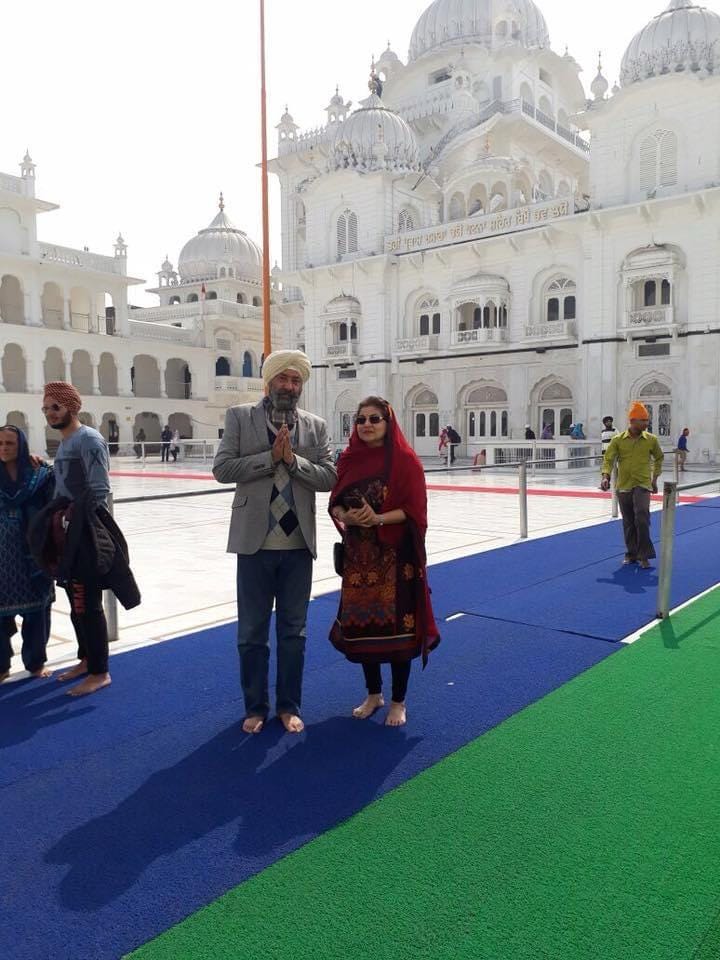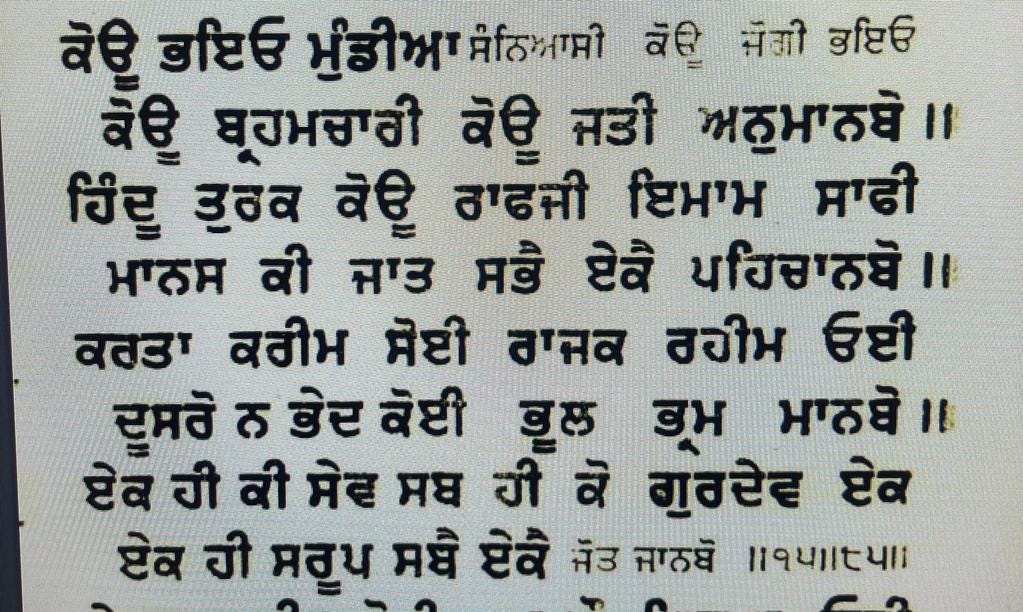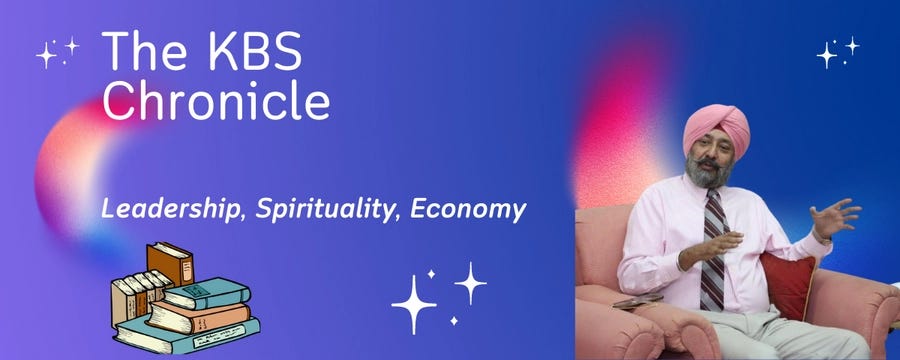Guru Gobind Singh: "Recognize all of mankind as one"
Celebrating 'Agman Purab' (Birth Anniversary): Embracing 'ਮਾਨਸ ਕੀ ਜਾਤ ਸਬੈ ਏਕੈ ਪਹਚਾਨਬੋ' - Recognizing the Oneness of Humanity .
Guru Gobind Singh Ji's Inspiring Legacy
As we commemorate the birth anniversary of the tenth Sikh Guru, Dashmesh Pita, Sri Guru Gobind Singh Ji, our warmest greetings go out to everyone. Born on December 22, 1666, in Patna Sahib (short video) to the Ninth Sikh Guru, Sri Guru Teg Bahadur Ji, and Mata Gujri Ji, Guru Gobind Singh Ji's life and teachings continue to inspire millions around the world. Guru Gobind Singh Ji's legacy is profoundly marked by the establishment of the Khalsa Panth in 1699, on the auspicious occasion of Baisakhi. This revolutionary spiritual order was conceived to combat the injustices and oppression prevalent during the Mughal era in India. Equally significant are the supreme sacrifices of his four sons, the esteemed Sahibzadas, whose bravery and martyrdom remain etched in the annals of history as symbols of ultimate devotion and resilience.
The Khalsa Panth: A Beacon of Spiritual Resilience and Resistance
While the historical narratives often spotlight his martial valour and the creation of the Khalsa, the depth and wisdom found in his divine poetry and hymns are equally profound but less known to the wider world. The revered Sri Guru Granth Sahib, initially compiled as the Adi Granth by the fifth Sikh Guru, Sri Guru Arjan Dev Ji, encapsulated the hymns of the first five Sikh Gurus alongside the spiritual verses of various Bhagats and Saints. Tragically, some earlier renditions of these scriptures were lost to the waters of the Sirsa river during Guru Gobind Singh Ji's strategic withdrawal from the Anandpur Sahib fortress en route to Chamkaur Sahib.

Beyond the Battlefield: The Poetic Wisdom of Guru Gobind Singh Ji
In the sanctified town of Talwandi Sabo, also known as Damdama Sahib, Guru Gobind Singh Ji undertook the monumental task of recompiling the Sri Guru Granth Sahib. It was here that he enshrined the divine verses of his father, Guru Teg Bahadur Ji, as Mehl 9, enriching the eternal scripture, now worshipped by the Sikh as the embodiment of the living Guru, with his sacred wisdom. Notably, in an act of humility, he chose not to include his own compositions in the Sri Guru Granth Sahib, reserving them instead for the Dasam Granth. This separate volume, though deeply venerated, is not as universally explored among the Sikhs, or scholars and devotees at large.
Celebrating Guru Gobind Singh Ji's Birthday: Embracing His Vision of Universal Brotherhood
Today, as we celebrate his birthday, we turn our attention to his verses from “Akal Ustat”—part of the “Dasam Granth”—to learn a bit more about his inclusive vision. These verses articulate a philosophy that transcends religious, social, and racial divides, asserting a universal brotherhood under one divine creation. Guru Gobind Singh Ji's message in “Akal Ustat” urges us to see beyond the superficial differences that fragment human unity, urging an egalitarian society grounded in the recognition of a shared, intrinsic divinity. It is this message of unity in diversity, of the underlying oneness of the human race, that resonates with compelling relevance today as it did centuries ago.
ਮਾਨਸ ਕੀ ਜਾਤ ਸਬੈ ਏਕੈ ਪਹਚਾਨਬੋ—Recognize all of mankind as one
ਕੋਊ ਭਇਓ ਮੁੰਡੀਆ ਸੰਨਿਆਸੀ ਕੋਊ ਜੋਗੀ ਭਇਓ
ਕੋਊ ਬ੍ਰਹਮਚਾਰੀ ਕੋਊ ਜਤੀ ਅਨਮਾਨਬੋ ॥
ਹਿੰਦੂ ਤੁਰਕ ਕੋਊ ਰਾਫਜੀ ਇਮਾਮ ਸਾਫੀ
ਮਾਨਸ ਕੀ ਜਾਤ ਸਬੈ ਏਕੈ ਪਹਚਾਨਬੋ ॥
ਕਰਤਾ ਕਰੀਮ ਸੋਈ ਰਾਜਕ ਰਹੀਮ ਓਈ
ਦੂਸਰੋ ਨ ਭੇਦ ਕੋਈ ਭੂਲ ਭ੍ਰਮ ਮਾਨਬੋ ॥
ਏਕ ਹੀ ਕੀ ਸੇਵ ਸਭਹੀ ਕੋ ਗੁਰਦੇਵ ਏਕ
ਏਕ ਹੀ ਸਰੂਪ ਸਬੈ ਏਕੈ ਜੋਤ ਜਾਨਬੋ ॥੧੫॥੮੫॥
The Hindi/ Devnagri1 version and the English transliteration2 is given in the footnotes.
English Translation
"Some have become shaven-headed renunciates, some yogis;
Some are celibates, some are ascetics without any pride (ego).
Some are Hindus, some Turks, some Rafzis (Shia), some follow Imam Shafi (Sunni);
Recognize all of mankind as one.
The Creator is the Generous One,
the Sustainer is the Merciful One Himself;
Do not recognize any other distinction;
consider such thoughts to be mistakes or illusions.
The service of the One is the teacher of all;
recognize that the One Light pervades all.
Recognize that all forms are of the One;
know that the Light within all is the same ||15||85||"

Analyzing the Interpreting these Priceless Verses
Unity in Diversity: The Vision of Guru Gobind Singh Ji
Guru Gobind Singh Ji's verses from "Akal Ustat" stand as a testament to the profound ethos of inclusivity and egalitarianism that he championed. In these lines, there is an assertion of a singular human identity that transcends the superficial divisions of caste, creed, and religious practice. The Tenth Guru articulates a vision of humanity unified under one divine light, where the external labels of 'Hindu', 'Turk', 'Rafzi', 'Imam', 'Shafi', or any other distinction of religious or social identity, are rendered insignificant in the face of a shared, inherent divinity.
The Divine Oneness: A Revolutionary Perspective
The essence of Guru Gobind Singh Ji's sermon is encapsulated in the notion that God, the Creator ('Karta'), the Generous ('Karim'), the King ('Rajak'), and the Merciful ('Rahim'), is singular and indistinguishable within His creation. The Guru dismisses any notion of duality or otherness ('Doosro na bhed'), calling such distinctions as mere illusions ('bhool bhram'). This perspective was revolutionary, advocating a society based on spiritual unity rather than divisive identities.
A Call to Universal Brotherhood
The Guru's sermon is not passive; it is an active call for recognition ('pehchaanbo') and realization ('jaanbo') that the divine light ('jot') is uniformly present in all. The Guru's words are a directive for service ('sev') to the one Creator, which he deems as the ultimate Guru ('Gurudev') for all humanity. This sermon, thus, lays the foundation for a society that is just, compassionate, and united, guided by the omnipresent luminosity of the divine.
The Spiritual Unity amid Religious Persecution
In an era where the spiritual canvas was painted with diverse expressions of faith and devotion, Guru Gobind Singh Ji’s verses emerge as a powerful exhortation to acknowledge the unity of the human spirit. These verses, composed during a time of intense persecution of non-Muslims by the bigoted Mughal Emperor Aurangzeb, serve not just as a call for unity, but as a profound acknowledgment of the divine essence inherent in every individual. They challenge us to look beyond mere tolerance, advocating for a deep-seated respect and honor for all spiritual paths as different manifestations of one singular, ultimate reality.
Humanity Beyond Dogma: The Compassion of Dashmesh Pita
Dashmesh Pita, through these timeless verses, upholds the highest human values, teaching us to distinguish the essence of a faith from the actions of its misguided proponents. Despite the brutality endured by his father, Sri Guru Teg Bahadur Ji, and the Sikhs under Aurangzeb's rule, Guru Gobind Singh Ji did not cast blame upon the followers of Islam as a whole. Instead, his writings reflect an extraordinary breadth of vision, recognizing that the deeds of a cruel ruler do not define the faith he professes. This distinction is crucial, marking Guru Gobind Singh Ji's wisdom as not only spiritual guidance but also a lesson in humanity and forgiveness. The verses of "Akal Ustat" thus resonate with the spirit of compassion and understanding, characteristics that defined the life and legacy of the Ten Sikh Gurus.
Guru Gobind Singh Ji: A Beacon of Socio-Spiritual Reform
In the our humble quest to analyze these verses, one cannot but reach the conclusion that Guru Gobind Singh Ji's vision for humanity was not confined to spiritual upliftment alone; it was also a socio-political ideology that challenged the status quo. By advocating for a singular divine essence within all, the Saint-Soldier undermined the hierarchical structures that had long perpetuated inequality and division. This sermon, therefore, is not only a spiritual guide but also a charter for human rights and dignity, a call for social reform that continues to resonate with universal relevance.
Consecration of Ram Mandir: Embracing the Teachings of Lord Ram and Guru Gobind Singh Ji for Global Harmony
As we approach the consecration of the Ram Mandir at Ayodhya on 22nd January 2024, a pivotal moment that resonates deeply with the timeless teachings of 'Maryada Purushottam' Lord Ram, we find a profound synergy with the principles echoed in Guru Gobind Singh Ji’s verses. The ideals set by Lord Ram, centuries before the Christian era, serve as a beacon of righteousness, justice, and moral governance. In a similar vein, Guru Gobind Singh Ji's compositions offer a resonant and self-reinforcing message, one that transcends religious boundaries and promotes a universal doctrine of equality, compassion, and justice.
This convergence of ancient wisdom and the enlightened teachings of Guru Gobind Singh Ji lays a robust foundation for fostering universal peace and harmony, particularly relevant as we commemorate his birth anniversary. In a world grappling with conflicts, disease, and poverty, the profound messages of these spiritual luminaries shine as a beacon of hope for a more compassionate and equitable society. They inspire us to embrace justice and empathy, transcending religious and cultural divides. While we celebrate in anticipation of the consecration of Lord Ram's Mandir in Ayodhya, it is also a time to deeply reflect upon and embrace the teachings of Guru Gobind Singh Ji. Internalizing his words, we commit ourselves to building a world that exemplifies the virtues of these great beings, fostering a legacy of unity and understanding in our diverse global community.
कोऊ भइओ मुंडिया संन्यासी कोऊ जोगी भइओ कोऊ ब्रह्मचारी कोऊ जति अनमानबो ॥ हिन्दू तुर्क कोऊ राफजी इमाम साफी मानस की जात सभै एकै पहचानबो ॥ करता करीम सोई राजक रहीम ओही दूसरो न भेद कोई भूल भ्रम मानबो ॥ एक ही की सेव सभही को गुरुदेव एक एक ही सरूप सभै एकै जोत जानबो ॥१५॥८५॥
Ko-oo bhaio mundia sanyasi ko-oo jogi bhaio Ko-oo brahmchari ko-oo jati anmaanbo || Hindu Turk ko-oo raafzi imam saafi Maanas ki jaat sabhai eke pehchaanbo || Karta karim soi raajak raheem ohi Doosro na bhed koi bhool bhram maanbo || Ek hi ki sev sabhai ko gurudev ek Ek hi saroop sabai eke jot jaanbo ||15||85||







Guru Gobind Singh ji : AN EMBLEM OF SACRIFICE .
History books have no example where a son sacrifices his father , father sacrifices his children for religion and stand for what is right.
May waheguru’s blessings be upon us all.
ਦਸਮ ਪਿਤਾ ਦੇ ਆਗਮਨ ਪੁਰਬ ਦੀ ਲੱਖ ਲੱਖ ਵਧਾਈ 🙏🙏🙏